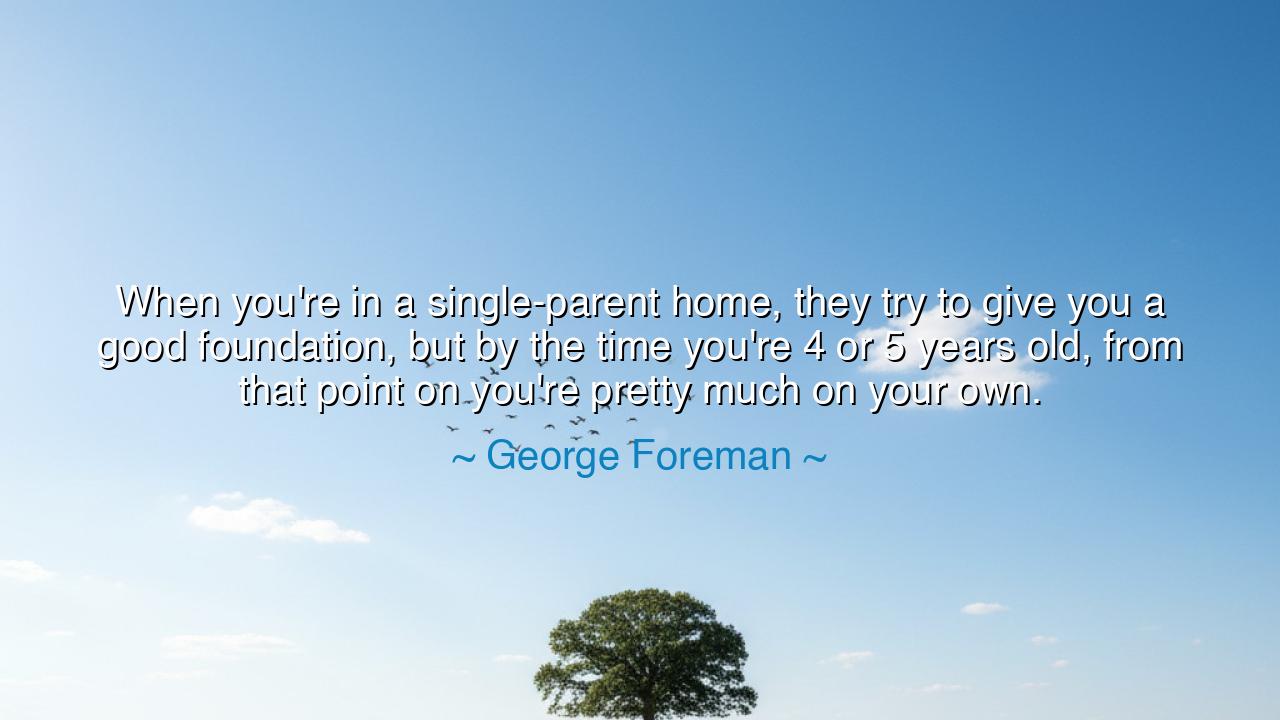
When you're in a single-parent home, they try to give you a good
When you're in a single-parent home, they try to give you a good foundation, but by the time you're 4 or 5 years old, from that point on you're pretty much on your own.






When George Foreman said, “When you’re in a single-parent home, they try to give you a good foundation, but by the time you’re 4 or 5 years old, from that point on you’re pretty much on your own,” he spoke from the heart of struggle and the wisdom of survival. His words are not bitter, but honest—a reflection of the reality faced by many who grow up in hardship, where childhood ends too soon and independence comes not by choice, but by necessity. In this short confession, Foreman reveals both the fragility and the strength of those who are raised in the crucible of limited means and abundant responsibility.
To understand the meaning of his words, one must first hear the tone beneath them—the tone of forged resilience. In a single-parent home, love is present, but time is scarce. Parents fight not only to nurture but to survive. The child, though cared for, begins early to learn the art of self-reliance. By the time one reaches “four or five years old,” Foreman suggests, life begins its training. The lessons are not in books or classrooms, but in observation, endurance, and adaptation. Those who grow up in such homes are taught by circumstance to stand on their own legs before most have learned to walk steadily.
Foreman’s words rise from the soil of his own life. Born into poverty in Marshall, Texas, he was raised by a mother who carried the weight of the world on her shoulders. He knew hunger, fear, and the ache of absence. Yet from that scarcity came an indomitable spirit—the same spirit that would later make him a world heavyweight champion, an Olympic gold medalist, and a man of unshakable faith. When he says, “you’re pretty much on your own,” it is not a lament—it is a declaration of how strength is born in solitude, how necessity shapes warriors, and how early trials become the foundation of lifelong triumph.
This truth is not new. The ancients told of it through parable and legend. Think of Hercules, who, though born of a god, was made mighty not through divine privilege but through trials. From his youth, he was forced to fight—monsters, labors, and his own flaws. Like Foreman, he learned that greatness is rarely gifted; it is earned in the absence of ease. Both men’s stories teach us the same eternal lesson: that struggle is the forge of strength, and that those who must fend for themselves early often grow into the fiercest defenders of others.
But Foreman’s words also carry compassion. He does not blame his mother, nor scorn the home he came from. He speaks with understanding: that a parent’s love can build only part of the foundation; the rest must be built by the child. This truth is both harsh and holy. It teaches that while love shelters us, life demands growth beyond that shelter. To be “on your own” is not abandonment—it is initiation. It is the world saying: Now, you must become your own guardian.
From his story, and from this quote, there arises a lesson for all who struggle under the weight of early responsibility: do not curse your hardships—use them. The child who learns to survive without excess becomes the adult who thrives without fear. The young who are forced to stand alone develop the muscle of independence, the wisdom of empathy, and the courage to protect what they build. The foundation given by love, though small, becomes the cornerstone upon which a vast and powerful life may rise.
So let George Foreman’s words echo across generations: your beginnings do not define your destiny—they prepare you for it. If you come from a place where comfort was scarce, let it sharpen your will. If you were made to walk alone, let it teach you balance. Build upon what was given, no matter how humble, and add your own strength to it. For the child who was “on his own” at five may one day stand as a giant among men—and in that moment, he will understand that solitude was not his enemy, but his teacher.






AAdministratorAdministrator
Welcome, honored guests. Please leave a comment, we will respond soon